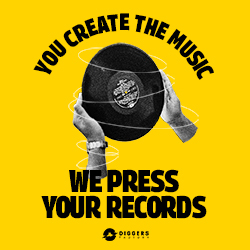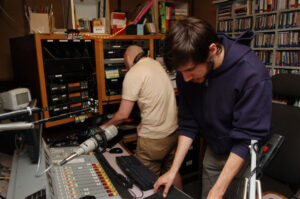Types of Radio Station Jobs| Radio Station Staff & Personnel
Contact Us
Music Promotion Guide
Whether you're just starting out or have a few tours under your belt come check out our in-depth Promotion Guide.
Press Registration
Sign up for our press releases and pre-release material.
The Indie Bible
The Indie Bible has been a staple for musicians and performing artists for over 20 years. Learn more in our writeup below.

It’s important for musicians to be aware that radio stations aren’t quite the norm in terms of traditional business structure. Everyone knows what a receptionist, HR person, or manager does — but what about a Music Director, or a Production Director? What about a Maintenance Engineer? Radio stations are loaded with industry-specific positions, the details of which many musicians may not be familiar with off-hand (unless they’ve already done their homework, in which case, kudos). Just as you wouldn’t find a cinematographer at an accounting firm, you won’t find an on-air personality working at a grocery store. Radio stations are largely made up of employees who function in ways specific to the radio business. For the sake of professionalism, it’s critical for musicians to familiarize themselves with what those positions are, and what the people who fill them actually do. To that end, we’ve assembled this handy guide to radio station personnel.
ANNOUNCER
At the most basic level, an Announcer, well, announces. Of course, there’s more to it than that. The Announcer is essentially the voice of the radio station because the Announcer is the person responsible for introducing content. Not only do Announcers lead into the actual tracks – they also read the advertisements and public service announcements that aren’t quite actual commercials. If you’ve ever heard someone rattle off a slogan like, “X Brand, for your toughest headaches,” it was probably an Announcer.
In addition to taking on a slew of announcement-related tasks, radio station Announcers also have some other responsibilities depending on factors like the station’s size and budget. For example, the Announcer at a smaller station might be in charge of some technical duties, such as running the control board or keeping logs of the programs.
CHIEF ENGINEER
A radio station’s Chief Engineer makes sure that the station has all the technology necessary to get the music on the air, and that all the equipment related to broadcasting is working properly. If a problem crops up with the transmitter or radio tower, for example, the Chief Engineer is the person who takes care of it. Due to the highly technical nature of their duties, Chief Engineers often have special training or certifications. Some common duties a Chief Engineer might be responsible for include:
- Supervising the technicians while a live broadcast is in progress.
- Scheduling maintenance for gear and equipment.
- Making sure the radio station is in compliance with requirements set by the FCC (Federal Communications Commission).
MAINTENANCE ENGINEER
Radio stations utilize a lot of technology. In fact, you probably can’t even picture the innards of a radio station without immediately envisioning heaps of wires, cords, plugs, buttons, and switches. When it comes to routine maintenance, installation, and trouble-shooting, that’s where the Maintenance Engineer comes in. Maintenance Engineers work on everything from control consoles to computers to microphones. If the station gets complaints about interference, the Maintenance Engineer will figure out what’s going on. In this regard, Maintenance Engineers have a similar job to the Chief Engineer. Radio engineering is also referred to as broadcast engineering.
MUSIC DIRECTOR
The Music Director or M.D. is the person who handles a radio station’s music library. He or she works closely with the Program Director (who we’ll get to shortly) to help choose which recordings will ultimately be played on-air. In addition to shaping the tone of the station, the M.D. is also responsible for:
- Taking most of the incoming calls from record labels and musicians.
- Networking and connecting with representatives from the music industry.
- Coming up with ideas for contests, promotions, giveaways, and other projects that can give the station a publicity and marketing boost.
- In many cases, MDs double or at least have experience as DJs or On-Air Personalities. Depending on the station’s size and budget, the M.D. might merge positions with the Program Director.
For all of these reasons, Music Directors are especially important for artists aspiring toward airplay to try and build good professional relationships with.
NEWS DIRECTOR
As the title suggests, the News Director or N.D. is the person in charge of the news program or programs on a radio station. The News Director is responsible for digging up, evaluating, and assigning news stories for the reporting staff to cover. The News Director also directs and supervises personnel belonging to the station’s news department. In short, the N.D. is the person who is in charge of maintaining a radio station’s journalistic integrity, ethics, and accuracy of reporting information.
ON-AIR PERSONALITIES
On-Air Personalities do a lot of talking, but they don’t perform the same function as an Announcer. While an Announcer gives a lead-in to content, be it music or otherwise, On-Air Personalities are the actual DJs, or the hosts of the programs themselves. Of course, On-Air Personalities have varying personas, but in general, they tend to be talkative and highly energetic in order to keep the audience at home engaged.
While you can’t expect to introduce yourself to a DJ and just have him or her spin your music, you can listen to what certain personalities play and what they talk about. As faces of the station, they also tend to attend live concerts and public events to represent the brand. These are places you can meet and interact with professional DJs and get on their “radar”. While just handing a CD to a DJ may not endear you to them, it’s a good artistic social practice to support your local station and DJ and if you work hard promoting yourself and play out enough, they’ll eventually catch onto what you do whether they personally like it or not.
PRODUCTION DIRECTOR
The Production Director, sometimes called the Production Manager, is a little like an air traffic controller: they keep everything production-related flowing smoothly. The Production Director typically manages tasks like:
- Deciding which Announcers will go on (and when).
- Producing commercials the station may want to air.
- Taking care of the logistics of recording sessions with artists.
- Collaborating with people from accounting to make sure that all invoices are getting processed appropriately.
- Maintaining the library of Director’s reels.
PROGRAM DIRECTOR
From a musician’s point of the view, the Program Director is one of the most important people at a radio station, because the Program Director is the person who ultimately decides what makes it onto the airwaves — and, just as critically, what doesn’t. It’s a common misconception that DJs pick the music they spin, but outside of college radio, that isn’t the case: the Program Director chooses the music (with assistance from the Music Director). Because the Program Director has discretion over what tracks ultimately get to be played, it’s important for beginning musicians to work with promoters who can help act as a liaison between the artist and the Program Director.
PROMOTIONS DIRECTOR
Every business entity needs to market an image, especially in the media, and that’s where the Promotions Director comes in. But not only does the Promotions Director promote the station itself — but they also work with advertisers and sales personnel, as well as working with the Program Director to put together on-air promotions for the station to put out. Because Promotions Directors are in charge of coming up with ideas for promotional events and other ways to generate publicity, such as giveaways, live broadcasts, and contests, they intermingle with all of the other departments at a radio station, particularly people from sales and marketing.
STATION MANAGER
As the name implies, the Station Manager oversees just about everything that goes on at a radio station. In this way, the Station Manager is roughly equivalent to a traditional business’ COO, or Chief Operating Officer. Station Managers are responsible for numerous tasks, with some common examples being:
- Hiring, training, and supervising various employees.
- Coordinating who’s going to be responsible for what.
- Planning schedules for meetings, programs, and other station functions.
- Identifying financial goals and planning ways to meet them.
- Making sure nothing is out of compliance with state or federal laws.
Getting music out on the air takes a lot of hard work, whether it’s coming from a technological, financial, or creative perspective. From the Chief Engineer to the Promotion Director to the – Announcer and beyond, radio stations are staffed by a core of dedicated, talented professionals who work in very different ways to bring music into cars and homes across the country. The more you can familiarize yourself with what radio station personnel do, the better your chances of getting airplay.
INTERNS
The radio industry still utilizes interns to provide work-experience and industry-specific exposure to college students and graduates interested in careers in the radio world. Although the stereotype of interns conjures images of coffee runs and xeroxing (and no doubt interns in the radio industry still do their fair share of office chores), interns at a radio station are good to know and come into contact with because they also tend to shoulder responsibilities more useful to the musician.
They take phone calls, so if contacting a radio station you may speak to an intern before you move up the chain to promotions director or music director. They screen incoming advertisements and clients, listen to mailed in CDs and demos, and are very likely to be the first ears to hear music sent in by radio promotion companies like us. That makes them important arbiters of taste, despite their not having official jobs at the stations they support. They aren’t 100% integrated into the company, either, so sometimes interns have an understanding of the inner workings of personalities at the station that can come in handy if you are trying to reach a certain DJ or manager.
They also usually attend more shows than the higher-ups at the station and have a finger on the pulse of what clubs in town are right for what bands and can sometimes help new bands get on shows with other bands because they’re plugged into the scene. Interns spend lots of time promoting their station at concerts and public events, so they usually know the who’s who and the what’s what when it comes to getting sets and with the right bands.
They draft contracts, write and coordinate email blasts, may have special appearances on personalities’ programs, and, yes, get coffee and photocopy items in the office from time to time. So don’t forget about the humble intern, he or she could help your music make it to rush hour programming just by the click of a link and a word in a music programming meeting.
FREQUENTLY ASKED QUESTIONS
Who listens to non-solicited music at radio stations? Usually the interns or members of the musical director’s team. Sometimes no one, and for that reason, Planetary Group is here to work with the radio station departments on your behalf.
Will a DJ play my music if I email it to them? In most instances, if this is the only way they’ve ever heard of you, no. But if you play often in their area, work hard promoting yourself, and have a decent band with good material the odds increase. Planetary Group can consult with you to help build your brand and make sure your music is ready for radio play.
Of course, having an experienced team of professional promoters helps, too. If you’re ready to start exploring how pro promotion could help get your act noticed, call Planetary Group at (323) 952-5050. While we’re based out of L.A., we work with musicians across the country and around the world.
Ready to Get Started?
For over 20 years Planetary has worked with a variety of musicians from all genres, signed and unsigned, self-released, indie and major labels. Planetary can help to create a solid foundation for new artists, and take all artists to new levels.
Hear It From Our Clients
For over 20 years Planetary has worked with a variety of musicians from all genres, signed and unsigned, self-released, indie and major labels. Planetary can help to create a solid foundation for new artists, and take all artists to new levels.
![]()
![]()
Working with Planetary has been awesome! Their weekly reports are super detailed and make it easy to track how the promo is doing. They have been super supportive and great and explaining the data we get every week! This has been super helpful as a first timer! I will personally be back!
C. Malz
![]()
![]()
Worked with Planetary on our first full length album on a US/CAN radio campaign. The album did well, charted all over North American stations and we got to make some in roads for interviews and live sessions. The weekly reports were very helpful as well.
A. Suns
![]()
![]()
I just finished an 8 week campaign with The Planetary Group. The entire team was professional, competent and friendly to work with. The campaign was very effective in getting my music very significant airplay with medium rotation on multiple station and even as high as a top 10 rotation.
C. Taylor
Our Blog
For over 20 years Planetary has worked with a variety of musicians from all genres, signed and unsigned, self-released, indie and major labels. Planetary can help to create a solid foundation for new artists, and take all artists to new levels.
How To Network Successfully As A Musician
Networking is a crucial aspect of success in any industry, and the music business is no exception. From connecting with other musicians and industry...
The Best and Worst Days and Times To Post On each Social Media Platform
Whether you’re a band, a brand, or just an individual person who is hoping to keep in touch with people around the world and what’s happening in the...
Get More Spotify Streams
Ready to turn up the volume on your Spotify streams? Whether you're a rising star or a shower-singing sensation, streaming platforms like Spotify...

For over 20 years Planetary has worked with a variety of musicians from all genres, signed and unsigned, self-released, indie and major labels. Planetary can help to create a solid foundation for new artists, and take all artists to new levels.
About Planetary Group
© 2025 Planetary Group | Privacy Policy | Terms of Service






